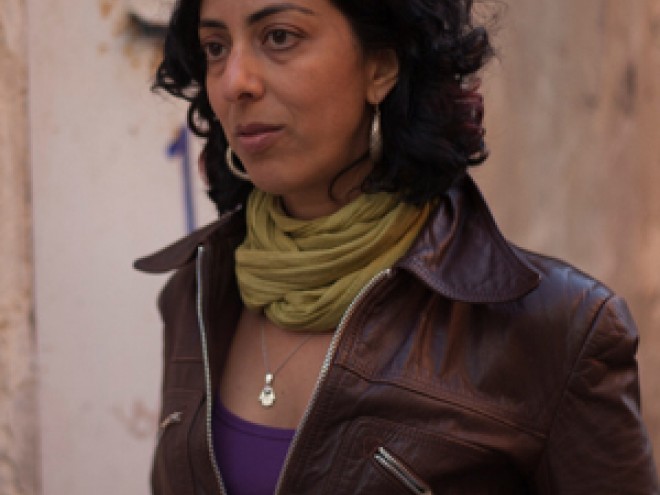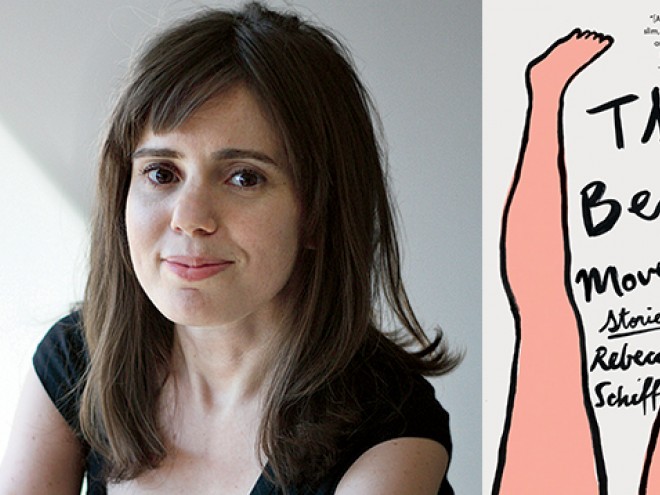Posted by Naomi Firestone-Teeter
 Today we hear from one final 2015 Sami Rohr Prize finalist: Molly Antopol. Molly’s debut collection of stories, The UnAmericans, received praise from around literary (and Jewish) universe, and even made it to the longlist for a 2014 National Book Award, so we were thrilled to welcome her to the Sami Rohr literary community. We have lots about Molly in JBCland, including her Visiting Scribe posts and her video chat for JBC Book Clubs (I even wrote about Molly for another site, recommending a wine for book clubs to enjoy while reading the book!), but we couldn’t resist the opportunity to share a little more about this highly talented author below.
Today we hear from one final 2015 Sami Rohr Prize finalist: Molly Antopol. Molly’s debut collection of stories, The UnAmericans, received praise from around literary (and Jewish) universe, and even made it to the longlist for a 2014 National Book Award, so we were thrilled to welcome her to the Sami Rohr literary community. We have lots about Molly in JBCland, including her Visiting Scribe posts and her video chat for JBC Book Clubs (I even wrote about Molly for another site, recommending a wine for book clubs to enjoy while reading the book!), but we couldn’t resist the opportunity to share a little more about this highly talented author below.
And, of course, a hearty congratulations again to our other four finalists, who have been profiled over the past several weeks: Ayelet Tsabari, Kenneth Bonert, Yelena Akhtiorskaya, and Boris Fishman. Be sure to check back soon to see which of these authors will be taking home $100,000.
What are some of the most challenging things about writing fiction?
Honestly? Everything! I’ve heard some writers talk about stories arriving fully formed in their minds, and all they have to do is transcribe. That’s never happened for me. But I’m grateful for it — all of the stories in my book took at least a year, sometimes two, to write. Every one of them changed drastically draft by draft, and I often don’t discover what a story is truly about until the tenth or twelfth or fifteenth version.
What or who has been your inspiration for writing fiction?
Many of my relatives are incredible storytellers and I started thinking about how best to tell a story when I was a kid. When it was my turn to talk at the dinner table, I knew I’d better have something interesting to say. A lot of my family’s stories revolved around their involvement in the communist party. I heard so many tales of tapped lines and dinnertime visits from the FBI, and many of the stories in my book grew out of my desire to understand what it might have been like for my mother and her siblings to have grown up under such intense surveillance, knowing that their most intimate moments were being recorded and catalogued.
Who is your intended audience?
I like to picture a better version of myself reading whatever I write — a version that can’t be dismissive or judgmental, a version that understands that in order to write the kind of fiction I strive to write, it’s necessary to feel empathy for even the least “likeable” or sympathetic people.
Are you working on anything new right now?
I’m at work on a novel, called The After Party. It’s set in Israel and the U.S. — but I’m too superstitious to say anything else!
What are you reading now?
Louise Gluck’s gorgeous new poetry collection, Faithful and Virtuous Night, and a collection of linked stories, Uncle Peretz Takes Off, by another of my favorite writers, Ya’akov Shabtai.
Top 5 favorite books
- Enormous Changes at the Last Minute by Grace Paley
- Binocular Vision by Edith Pearlman
- The Assistant by Bernard Malamud
- All Aunt Hagar’s Children by Edward P. Jones
- The Puttermesser Papers by Cynthia Ozick
When did you decide to be a writer? Where were you?
It wasn’t a conscious decision, exactly. I’ve always read a lot. As a kid, I had all sorts of imaginary friends and my mom says I used to spend full days writing myself into whatever book I was reading. But writing as a career? It felt to me like a pie-in-the-sky profession, like being an astronaut or a magician. I figured I’d sneak in time to write when I wasn’t working — when I was a kid I wanted to be a marine biologist or a zoologist.
What is the mountaintop for you — how do you define success?
Seeing someone on the subway reading my book!
How do you write — what is your private modus operandi? What talismans, rituals, props do you use to assist you?
I don’t have a special writing hat or a lucky bathrobe or anything like that. If I can sit down and get something done, it doesn’t matter if I’m dressed or still in my pajamas, or at my desk or on the couch. My only rule is to get started in the morning. I like to roll out of bed and just  get to work, before my day gets too cluttered and the emails begin to pile up. I treat writing like a job, putting in full days on the days I don’t teach and half days on the days that I do. I shut the phone off, and lately I’ve been using a program that prevents me from accessing the Internet. I’m horribly addicted and researching one small (yet essential!) detail for a story can often lead to a three-hour black hole from which I only emerge once I’ve learned everything I can about something wholly unrelated to my book and have won a bidding war on eBay over a vintage lamp I never wanted in the first place.
get to work, before my day gets too cluttered and the emails begin to pile up. I treat writing like a job, putting in full days on the days I don’t teach and half days on the days that I do. I shut the phone off, and lately I’ve been using a program that prevents me from accessing the Internet. I’m horribly addicted and researching one small (yet essential!) detail for a story can often lead to a three-hour black hole from which I only emerge once I’ve learned everything I can about something wholly unrelated to my book and have won a bidding war on eBay over a vintage lamp I never wanted in the first place.
What do you want readers to get out of your book?
I hope readers get swept up in the stories the way I’ve gotten swept up in so many books. I’ve missed my bus stop any number of times because I was so wrapped up in what I was reading, and felt disoriented when I had to put the book away and was no longer in the world of my characters.
Molly Antopol’s debut story collection, The UnAmericans, was published here by W.W. Norton in 2014, and in six other countries. She teaches creative writing at Stanford University, where she was a recent Wallace Stegner Fellow. A recipient of the National Book Foundation’s 5 Under 35 award and longlisted for the National Book Award, she holds an MFA from Columbia University and lives in San Francisco.
Related Content:
- Molly Antopol on Edith Pearlman
- Molly Antopol on Chaim Potok’s The Chosen
- Reading List: Cynthia Ozick
- Sami Rohr Prize Awardees



